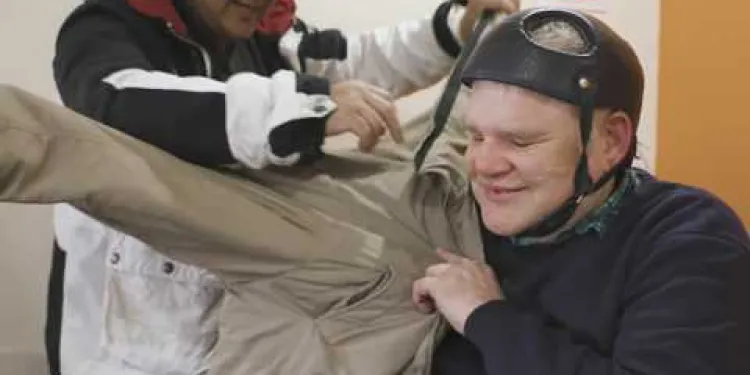
Find Help
More Items From Ergsy search
-

What kind of studies are conducted to investigate links between medications and autism?
Relevance: 100%
-

Is paracetamol linked to autism?
Relevance: 73%
-

Are vaccines linked to autism?
Relevance: 69%
-

What causes autism?
Relevance: 67%
-

Why is there concern about paracetamol and autism?
Relevance: 66%
-

Is there any scientific evidence that links paracetamol use to autism?
Relevance: 65%
-

What are the limitations of studies examining paracetamol use and autism?
Relevance: 63%
-

Is there a genetic component to autism?
Relevance: 61%
-

Can autism be cured?
Relevance: 60%
-

Is autism more common in boys or girls?
Relevance: 60%
-

What can cause autism, if not paracetamol?
Relevance: 60%
-

Is there an autism test?
Relevance: 59%
-

What is Autism?
Relevance: 59%
-

How prevalent is autism?
Relevance: 58%
-

Is there any risk of using paracetamol outside of pregnancy with regard to autism?
Relevance: 58%
-

Autism - My Story - Rosalind | NHS
Relevance: 57%
-

How is autism diagnosed?
Relevance: 57%
-

What is the autism spectrum?
Relevance: 56%
-

Can adults have autism?
Relevance: 55%
-

What are the signs of autism?
Relevance: 55%
-

Autism - My Story - Adrian | NHS
Relevance: 54%
-

Autism: Graeme's story | NHS
Relevance: 53%
-

How does autism affect communication?
Relevance: 51%
-

What are some common therapies for autism?
Relevance: 51%
-

Can people with autism lead independent lives?
Relevance: 49%
-

What role do sensory issues play in autism?
Relevance: 49%
-

What is the difference between autism and Asperger's syndrome?
Relevance: 49%
-

Autism Assessment - What Happens in Your Appointment
Relevance: 49%
-

How can families support a member with autism?
Relevance: 47%
-

The NHS Long Term Plan for learning disability and autism
Relevance: 47%
-

What advice is available for parents concerned about autism risks?
Relevance: 47%
-

How can early intervention help children with autism?
Relevance: 47%
-

Is it possible to study nursing part-time?
Relevance: 42%
-

Instructions for setting up your home sleep study
Relevance: 41%
-

Transforming Care for people with Learning Disabilities and/ or Autism: Peter's Story
Relevance: 41%
-

Where can I find research studies on air pollution and asthma in my area?
Relevance: 37%
-

Are there any scientific studies supporting homeopathy?
Relevance: 37%
-
How long do studies suggest taking aspirin for cancer prevention?
Relevance: 36%
-

Has paracetamol been linked to other developmental issues besides autism?
Relevance: 36%
-

Have any major health organizations advised against using paracetamol during pregnancy due to autism concerns?
Relevance: 35%
Introduction
The relationship between medications and autism is an area of active research in the medical community. Numerous studies investigate the potential links between medication use during pregnancy or early childhood and the development of autism spectrum disorders (ASD). Understanding these links is crucial for healthcare professionals, parents, and policymakers alike.
Epidemiological Studies
Epidemiological studies are essential in understanding the potential associations between medication use and autism. These studies typically involve large populations and aim to observe the frequency and distribution of autism in relation to certain medication exposures. Researchers might access healthcare records or use questionnaires to collect data on medication use during pregnancy or early life and then track autism diagnoses in children. These studies can help identify potential risk factors or correlations but cannot prove causation.
Case-Control Studies
Case-control studies are another primary method used to explore potential links between medications and autism. In these studies, researchers identify individuals with autism (cases) and compare them to a control group without autism. They then look retrospectively at the medication histories of both groups. By comparing the frequency of medication use between the two groups, researchers seek to find associations that may warrant further investigation.
Cohort Studies
Cohort studies are prospective in nature, following a group of individuals over time to see how exposures affect outcomes. Researchers might follow pregnant women who are taking specific medications to observe any long-term effects on their children, including the development of autism. This type of study can provide more robust evidence because it tracks development and exposures over a defined period, reducing recall bias.
Animal Studies
Animal studies offer researchers the chance to explore potential biological mechanisms linking medications and autism. By studying animals exposed to certain drugs during pregnancy or early development, scientists can observe changes in brain structure, function, and behaviours that may be analogous to autism in humans. These studies help form hypotheses and guide further human research, although results must be extrapolated with caution.
Randomized Controlled Trials
Although randomized controlled trials (RCTs) represent the gold standard in medical research, ethical concerns often preclude their use in studying medication safety during pregnancy or early childhood. However, RCTs might be utilised in studies aiming to explore treatments for autism, helping to establish potential benefits or risks of interventions.
Conclusion
The investigation into links between medications and autism involves various study designs, each offering unique insights and limitations. A careful approach combining large-scale epidemiological data, observational studies, animal research, and RCTs where ethical ensures a comprehensive understanding, ultimately guiding safer medical practices and health advice. As research progresses, the importance of interdisciplinary efforts in tackling this complex issue remains paramount.
Introduction
People are researching how medications and autism might be connected. Scientists are studying if taking certain medicines when pregnant or as a small child might be linked to autism. Learning about these links is important for doctors, parents, and people who make health rules.
Epidemiological Studies
Epidemiological studies help us learn about possible links between medicines and autism. These studies look at many people to see how often autism happens when certain medicines are taken. Researchers might check health records or ask questions to gather this information. These studies can show patterns but do not prove if one thing causes another.
Case-Control Studies
Case-control studies are another way to see if there's a link between medicines and autism. Scientists find people with autism and compare them to people without autism. They look at what medicines both groups have taken. This helps them spot any differences that might need more research.
Cohort Studies
Cohort studies watch people over time to see how taking medicine affects them later. Researchers might follow women who take certain medicines while pregnant to see how it affects their children, like if the child develops autism. This helps researchers see patterns over time without relying on memory alone.
Animal Studies
Animal studies let scientists explore how medicines might be linked to autism. They look at animals that take certain drugs when they are developing and check changes in their brains or behavior. These studies give ideas for human research, but scientists have to be careful because animals and humans are different.
Randomized Controlled Trials
Randomized controlled trials (RCTs) are the best type of study for finding out if a treatment works. But, for safety reasons, it is hard to use them to study medicines during pregnancy or with small children. RCTs are more often used to test treatments for autism, showing how safe or helpful they might be.
Conclusion
Studying how medicines and autism are linked uses different types of research, each having its strengths and limits. Using big data from different studies helps us understand better. As we keep learning, working together among different experts is very important to find the best answers and give good health advice.
Frequently Asked Questions
What is the primary goal of studies investigating links between medications and autism?
The primary goal is to determine whether there is an association or causal relationship between medication use and the occurrence or exacerbation of autism spectrum disorder (ASD).
What types of studies are commonly conducted to explore links between medications and autism?
Common types of studies include epidemiological studies, case-control studies, cohort studies, randomized controlled trials, and meta-analyses.
What is an epidemiological study?
An epidemiological study investigates the patterns, causes, and effects of health and disease conditions in specific populations.
How do cohort studies contribute to understanding medication links to autism?
Cohort studies follow a group of people over time to see if certain exposures, like medication use, are associated with later outcomes, such as autism diagnosis.
What is a case-control study?
A case-control study compares individuals with a condition (cases) to those without (controls), looking for prior exposure to potential risk factors like medications.
How are randomized controlled trials used in this research?
They randomly assign participants to receive a medication or a placebo to directly assess the effect of the medication on autism development or symptoms.
What role does genetics play in studies of medication links to autism?
Genetic factors are considered by comparing populations with different genetic backgrounds to discern whether genetic predispositions affect medication-related autism risk.
What kind of data is gathered in studies connecting medications and autism?
Data typically includes medical records, medication histories, developmental milestones, genetic information, and environmental exposure histories.
How can meta-analyses help in exploring medication and autism links?
Meta-analyses combine data from multiple studies to increase statistical power and provide a more precise estimate of the effect of medications on autism risk.
Are animal studies used in autism-medication research?
Yes, animal studies are used to explore biological mechanisms and effects of medications on brain development that might relate to autism.
Can observational studies prove causation between medications and autism?
Observational studies can suggest associations but cannot definitively prove causation; controlled experiments are needed for causal conclusions.
Why is it important to control for confounding variables in these studies?
Controlling for confounding variables ensures that any observed association is due to the medication and not influenced by other factors.
What ethical considerations are involved in these studies?
Ethical considerations include ensuring informed consent, minimization of harm, respect for participants, and ensuring that data is anonymized and protected.
How does timing of medication exposure affect study outcomes?
The timing of exposure, such as during pregnancy or early childhood, can significantly influence the potential impact on autism development.
What are some challenges in studying the link between medications and autism?
Challenges include varying autism symptoms, genetic diversity, differences in environmental exposures, and difficulties in accurate data collection.
Have any medications been conclusively linked to autism?
As of now, no medications have been conclusively proven to cause autism, though research continues to explore potential associations.
Why is it important to study the possible medication-autism link?
Understanding potential links can help improve safety guidelines, inform prescribing practices, and lead to better overall public health outcomes.
What role do family studies play in this research?
Family studies help assess the hereditary links and shared environmental factors that might interact with medication exposure to influence autism risk.
How might future research evolve in this field?
Future research may increasingly utilize large-scale genetic data, advanced statistical methods, and international collaboration to better understand these links.
How do researchers address biases in medication-autism studies?
Researchers use techniques such as blinding, randomization, and thorough statistical analysis to minimize biases and clarify findings.
What do studies look for when checking if medicines and autism are linked?
The main goal is to find out if taking medicine is linked to starting or making autism spectrum disorder (ASD) worse.
What studies are done to find out if medicines are linked to autism?
There are different kinds of studies that help us learn things. Here are some:
- Epidemiological studies: These look at how diseases affect groups of people.
- Case-control studies: These compare people with a problem to those without it to find out why it happens.
- Cohort studies: These follow a group of people over time to see what happens to them.
- Randomized controlled trials: These tests try different treatments on groups to see which works best.
- Meta-analyses: These look at lots of studies to find overall answers.
If you find reading hard, try using audiobooks to listen instead of read. Or ask someone to read with you.
What is an epidemiological study?
An epidemiological study is a way to find out how diseases affect people.
Scientists look at who gets sick and why.
They try to learn how to stop people from getting sick.
If you want to know more, ask a doctor or read a simple book about health.
Using pictures or watching videos can also help you understand better.
A study looks at health and sickness in groups of people. It checks why people get sick, how they get better, and what happens to them.
How do group studies help us learn about medicine and autism?
Group studies watch people over time to see how medicine might affect them.
This helps us find out if medicine is linked to autism.
Using tools like pictures or talking to someone can make it easier to understand.
Cohort studies watch a group of people over time. They check if things like taking medicine are linked to what happens later, like being told you have autism.
What is a case-control study?
A case-control study is a type of research where scientists look at two groups of people. One group has a particular problem or disease (these are the "cases"). The other group doesn't have the problem (these are the "controls").
Scientists compare the two groups to find out why the problem happens. They look at things like where people live, what they eat, or what they do every day.
To understand better, you can:
- Use pictures or charts: These can help you see how the two groups are different.
- Ask questions: If there is something you don’t understand, ask someone to explain it to you.
This study helps scientists find out what might cause a problem and how to stop it.
A case-control study looks at two groups of people. One group has a condition (they are called "cases"). The other group does not have the condition (they are called "controls"). The study checks to see if people in the first group (cases) took certain medicines before they got the condition.
How do scientists use randomized controlled trials in this research?
Scientists use a special test called a randomized controlled trial to study something. Here is how it works:
- People are picked randomly, like in a lottery.
- They are put into two or more groups by chance.
- One group gets the thing being tested, like a new medicine.
- Another group does not get it, so scientists can see the difference.
This test helps them understand if the new thing works or not.
Support Tools:
- Use pictures or drawings to help explain these ideas.
- Use simple words and short sentences.
- Repeat ideas in different ways for clarity.
They randomly put people into two groups. One group gets a real medicine, and the other group gets a fake medicine (called a placebo). This helps them test if the real medicine can help with autism symptoms or change how it starts.
How do genes help us understand medicine and autism?
Scientists look at different groups of people to see if genes make it more likely for someone to have autism after taking medicine. They check if people from different family backgrounds react to medications in similar ways. Tools like picture charts can help you understand how genes work. Talking to a helper or using simple diagrams can also make it easier to learn about genes and medicine.
What information do studies collect about medicine and autism?
Data usually includes a list of your visits to the doctor, medicines you take, important moments as you grow, your family health history, and things around you that might affect your health.
How can studies help us learn about medicine and autism?
Studies look at lots of information to answer questions. They collect data from many places.
This helps us see if medicine helps people with autism. It also tells us if there are problems with the medicine.
You can use tools like videos or pictures to help understand this better.
Ask someone you trust to talk about it with you. They can help explain new words.
Meta-analyses look at data from many studies. This helps researchers understand better how medicine might affect autism risk. They give a clear answer by using lots of information.
Do scientists study animals to find medicine for autism?
Yes, scientists study animals to learn how the brain works and how medicine affects it. This helps them understand autism better.
Do observational studies show that medicines cause autism?
Observational studies look at what happens in the real world. They watch and collect information but don’t change anything. These studies can find links or patterns.
But, they can’t show if one thing causes another. For example, they can’t prove if a medicine causes autism. Other things might be involved.
For better understanding:
- Use simple words and short sentences.
- Ask someone you trust to explain it to you.
- Draw pictures to help see what is happening.
Remember, it’s always okay to ask questions!
Watching how things happen can show links between them. But, just watching can't prove one thing causes another. To know for sure, we need special tests called controlled experiments.
Why do we need to think about other things that might change the results in these studies?
It's important to know what things might affect what we are studying. These things are called confounding variables.
For example, if we want to know if eating apples makes you happy, we need to think about other things that might also make you happy, like playing with friends.
By thinking about these things, we can make sure we are only looking at how apples affect happiness, not something else.
Here are some tools to help:
- Make a list of other things that might change the results.
- Ask simple questions to check if something else is making a difference.
Making sure other things don’t affect the results helps us know that any changes we see are because of the medicine and not because of something else.
What are the right and wrong things to think about in these studies?
When people do studies, they need to think about what is right and wrong. Here are some easy things to remember:
- Is it safe for the people in the study?
- Are we being fair to everyone?
- Did we ask permission from the people in the study?
- Are we keeping people's information private?
To help understand, you can use:
- Pictures and videos: They can show what is happening.
- Audio books: Listening can be easier than reading.
- Talking to someone: A friend or teacher can help explain.
When doing research, it is important to be fair and kind. Here are some things to remember:
- Ask people if they want to join and make sure they understand what it is about.
- Try not to hurt anyone.
- Treat everyone nicely.
- Keep their information private.
Using simple and short words can help. You can also try saying everything out loud or drawing pictures to make things clearer. If you need extra help, ask someone you trust. Tools that read out loud, like text-to-speech software, can be useful too.
How does taking medicine at different times change study results?
When kids or babies are in their mommy’s tummy or very young, things around them can change how their brains grow. This might affect if they have autism or not.
What makes it hard to study how medicines and autism are linked?
There are many challenges. These include different autism symptoms. People's genes are different too. The things people are around can be different. It's also hard to collect the right information.
Do medicines cause autism?
We don't know if any medicine can make autism happen for sure.
It's good to talk to a doctor about any worries.
You can use pictures or videos to help understand better.
Right now, no medicines have been found to definitely cause autism. Scientists are still studying this to learn more.
Why should we learn if medicine and autism are connected?
Learning about medicine and autism is important because:
- It helps doctors give better advice.
- It keeps kids safe and healthy.
- It helps families make good choices.
To understand this better, use simple tools:
- Ask questions if you're not sure.
- Use pictures to help explain.
- Talk to someone you trust.
Knowing how things connect can make things safer. It helps doctors know what medicines to give and keeps everyone healthier.
How do family studies help in this research?
Family studies look at how family history and the places we live can work together with medicine to affect the chance of having autism.
How could future studies change in this area?
How might people learn more about this topic in the future?
Researchers are people who study things to learn more. In the future, they might use new ways or tools to help them understand better.
Here are some ways studies might change:
- Use computers to discover new ideas.
- Talk to more people to get different opinions.
- Study new topics that people haven't looked at much before.
Tools that can help with studies:
- Easy-to-use computer programs.
- Drawing pictures to explain things simply.
- Talking with others to share ideas.
In the future, scientists might use big collections of genetic information and smart math tools. They will also work together with other countries. This will help them learn more about how things are connected.
How do researchers make sure medication-autism studies are fair?
When scientists study how medicine affects autism, they must be fair. Here’s how they do it:
- Check assumptions: They make sure they don't have any ideas that might change results.
- Use many people: They include lots of different people in the study.
- Ask for help: They work with other scientists to check their work.
- Share openly: They tell everyone what they find so others can look too.
To understand these studies better, try:
- Using simple dictionaries for hard words.
- Drawing pictures to show what the study means.
- Reading with a friend or a helper.
Scientists use ways to make their studies fair and clear. They hide some information, pick randomly, and use numbers to make sure they get good results.
Here are some tips to help understand:
- Use pictures or videos to see how these techniques work.
- Ask someone to explain new words or ideas.
- Try reading with a friend so you can talk about it together.
Useful Links
Have you found an error, or do you have a link or some information you would like to share? Please let us know using the form below.
-->
This website offers general information and is not a substitute for professional advice.
Always seek guidance from qualified professionals.
If you have any medical concerns or need urgent help, contact a healthcare professional or emergency services immediately.
Some of this content was generated with AI assistance. We’ve done our best to keep it accurate, helpful, and human-friendly.
- Ergsy carfully checks the information in the videos we provide here.
- Videos shown by Youtube after a video has completed, have NOT been reviewed by ERGSY.
- To view, click the arrow in centre of video.
- Most of the videos you find here will have subtitles and/or closed captions available.
- You may need to turn these on, and choose your preferred language.
- Go to the video you'd like to watch.
- If closed captions (CC) are available, settings will be visible on the bottom right of the video player.
- To turn on Captions, click settings .
- To turn off Captions, click settings again.
More Items From Ergsy search
-

What kind of studies are conducted to investigate links between medications and autism?
Relevance: 100%
-

Is paracetamol linked to autism?
Relevance: 73%
-

Are vaccines linked to autism?
Relevance: 69%
-

What causes autism?
Relevance: 67%
-

Why is there concern about paracetamol and autism?
Relevance: 66%
-

Is there any scientific evidence that links paracetamol use to autism?
Relevance: 65%
-

What are the limitations of studies examining paracetamol use and autism?
Relevance: 63%
-

Is there a genetic component to autism?
Relevance: 61%
-

Can autism be cured?
Relevance: 60%
-

Is autism more common in boys or girls?
Relevance: 60%
-

What can cause autism, if not paracetamol?
Relevance: 60%
-

Is there an autism test?
Relevance: 59%
-

What is Autism?
Relevance: 59%
-

How prevalent is autism?
Relevance: 58%
-

Is there any risk of using paracetamol outside of pregnancy with regard to autism?
Relevance: 58%
-

Autism - My Story - Rosalind | NHS
Relevance: 57%
-

How is autism diagnosed?
Relevance: 57%
-

What is the autism spectrum?
Relevance: 56%
-

Can adults have autism?
Relevance: 55%
-

What are the signs of autism?
Relevance: 55%
-

Autism - My Story - Adrian | NHS
Relevance: 54%
-

Autism: Graeme's story | NHS
Relevance: 53%
-

How does autism affect communication?
Relevance: 51%
-

What are some common therapies for autism?
Relevance: 51%
-

Can people with autism lead independent lives?
Relevance: 49%
-

What role do sensory issues play in autism?
Relevance: 49%
-

What is the difference between autism and Asperger's syndrome?
Relevance: 49%
-

Autism Assessment - What Happens in Your Appointment
Relevance: 49%
-

How can families support a member with autism?
Relevance: 47%
-

The NHS Long Term Plan for learning disability and autism
Relevance: 47%
-

What advice is available for parents concerned about autism risks?
Relevance: 47%
-

How can early intervention help children with autism?
Relevance: 47%
-

Is it possible to study nursing part-time?
Relevance: 42%
-

Instructions for setting up your home sleep study
Relevance: 41%
-

Transforming Care for people with Learning Disabilities and/ or Autism: Peter's Story
Relevance: 41%
-

Where can I find research studies on air pollution and asthma in my area?
Relevance: 37%
-

Are there any scientific studies supporting homeopathy?
Relevance: 37%
-
How long do studies suggest taking aspirin for cancer prevention?
Relevance: 36%
-

Has paracetamol been linked to other developmental issues besides autism?
Relevance: 36%
-

Have any major health organizations advised against using paracetamol during pregnancy due to autism concerns?
Relevance: 35%


